Black Mirror season 4 - every episode reviewed and rated
We break down and discuss each episode of the latest Black Mirror on Netflix
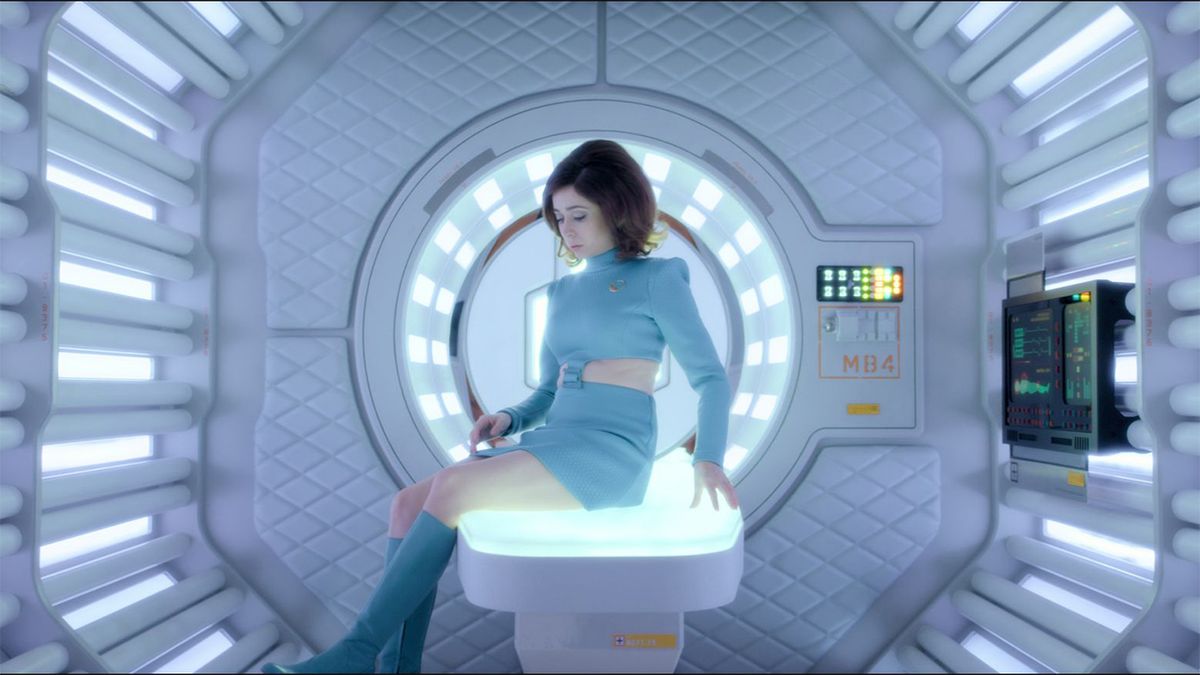
The new season of Black Mirror - available right now on Netflix - is tough to watch. While the show has always been designed to tap into our darkest paranoias about technology and modern life with the express purpose of making us squirm, Black Mirror season 4 takes this to a whole new level. In an era where trying to watch as many episodes as possible, all at once, has become something of a habit, this run of Black Mirror feels like anti-binge TV. Viewing multiple episodes back-to-back just isn’t very good for the soul. However, that shouldn’t take away from the quality of the ideas here or the execution, and there are some truly stand-out episodes in this dystopian anthology.
To reflect the variety of ideas on display, we’ve decided to review the whole season a little differently. Members of the GR team each picked out an episode that meant something to them personally, and reviewed it. So what you have below is an anthology review, neatly reflecting (pun intended) the way Black Mirror is presented. And please let us know your thoughts on Black Mirror S4 in the comments at the bottom. A warning: the are spoilers for each episode below!
Black Mirror season 4 - USS Callister review: “It’s like a really fucked up version of Toy Story”
With both Discovery and The Orville, you’d think we’d be sick to death of Star Trek-esque TV shows, but the very first episode of Black Mirror season 4 doesn’t care. It’s going to parody the hell out of the Original Series whether we like it or not, and actually... we love it! USS Callister doesn’t just riff off one of the most iconic sci-fi shows of all time; it mixes old school Trek with VR gaming to create a nightmare-fuelled video game story none of us ever want to be trapped in. Only Black Mirror, right?
The plot centres on Robert Daly, played by Jesse Plemons (if you think you recognise him, it’s because he looks a bit like Matt Damon), co-founder and head programmer of a hugely popular online multiplayer VR game. While Daly might be very talented when it comes to code, his real life interactions leave much to be desired. His friend/co-founder treats him with nothing but disdain, his subordinates don’t respect him (when they remember he exists), and despite his professional success, he still feels unfulfilled. The one thing which brings him joy is a private version of his game, which he’s recreated at home to look and feel exactly like his favourite retro sci-fi series, Space Fleet (AKA Star Trek).
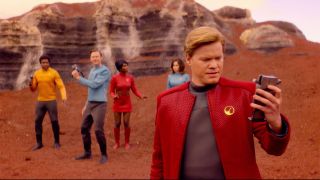
Naturally, Daly is the Captain and his crew is made up of people he knows, from his company’s co-founder James Walton (Westworld’s Jimmi Simpson), to his crush and new starter Nanette Cole (Cristin Milioti). Unsurprisingly, he gets his jollies by treating them how he never would IRL, but the ‘holy shit’ moment comes when you realise that he hasn’t just programmed the in-game characters to look like people he knows... he’s virtually cloned the real people themselves. His ‘crew’ are actually sentient beings, trapped aboard the USS Callister like prisoners, doomed to re-enact his sadists fantasies over and over again as he tries to make himself feel better about his real life. It’s like a really fucked up version of Toy Story if the toys hated Andy and just wanted to die.
As the opening episode to the fourth season of Black Mirror, USS Callister needed to start strong, and boy, did it! It’s not just the oh-so-very Black Mirror creepiest of the story, or the near spot on Star Trek references in the same year we got Star Trek Discovery and Star Trek: Bridge Crew... it’s the fact that Daly is the perfect villain. At first, you feel sorry for him. Who wouldn’t? It’s a story we’re all familiar with and as such, you’re on his side from the beginning. You want him to take charge of his company, put his colleagues in their place, and yes, eventually get the girl. The set-up is so familiar that you’re tricked into thinking he’s the hero, which makes it all the more horrifying when you realise he’s really the monster. All the terrible things he does in his virtual world are magnified because it’s basically what you wanted him to do in real life. Sure, you didn’t imagine that he’d find his confidence by torturing his co-workers, but still… you wanted him to take charge and this is what it looks like. Intelligent, surprising, feminist (“stealing my pussy is a red fucking line!”) - USS Callister is Black Mirror at its best. Lauren O’Callaghan
Episode score: 5/5
Sign up to the SFX Newsletter
Get sneak previews, exclusive competitions and details of special events each month!
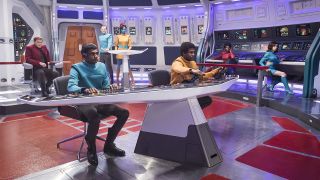
Black Mirror season 4 - Arkangel review: “Taps into parental fears extremely well and it’s a satisfyingly uncomfortable watch”
The paranoia of parenthood is a strong theme in Black Mirror season 4. It’s threaded through almost every episode (the only exception being Hang The DJ), but none capture the fear in a purer form than Arkangel. Directed by Jodie Foster, this story follows nervous single-mother Marie from the birth of her only child, Sara, to the inevitable, downbeat conclusion. The basic premise is that Sara is implanted with a chip in her brain that allows her mother to not only track her location and see through her eyes, but also to blur out and censor anything the daughter sees that might cause her stress. It’s all done via a little tablet, which actually beeps when Sara is seeing something distressing.
Much like most of the tech in Black Mirror, the Arkangel Project - which gives the episode its name - is terrifyingly believable, and you can imagine the take-up from scared parents would be high if it ever became a reality. Such a great concept, then, and a strong director… it’s surprising that Arkangel is one of the less remarkable episodes of season 4. It’s by no means a dud, and the fact it doesn’t take the concept to its darkest extreme (like Crocodile or Black Museum) is actually something that works in its favour. Hey, at least no-one dies.

Rosemarie DeWitt plays the paranoid mother fairly well, her overprotective nature neatly set-up by the opening scene (where Sara takes a couple of seconds to breathe after birth) and the interactions with her elderly father. Her descent into extreme overparenting when Sara becomes a teenager is believable too, if a little rushed, and the way she lashes out at boyfriend Trick will undoubtedly have played on the worst fears of most teenage boys.
The problem with the episode lies with the development of the daughter and her mother’s slightly inconsistent interactions with her. When Sara’s censorship is switched off, following a visit to the psychiatrist, we see her quickly absorbing all the stuff previously unavailable to her. But by the time she reaches teenage years, none of that seems to matter, and Sara is a perfectly healthy girl for her age. After that, the pace reaches a furious peak again, as she lies to her mum, sleeps with Trick, does drugs, and gets pregnant all in a short space of time. Given how paranoid Marie is meant to be, there’s no way she’d have simply left the Arkangel tablet locked away for so long. And if we’re wrong about Sara - and she isn’t a well-balanced teenager - there’s even less chance her mum wouldn’t have seen everything happen before.
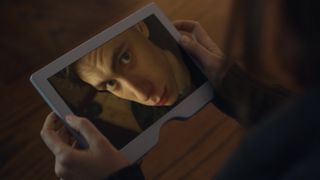
Generally, the episode taps into parental fears extremely well and it’s a satisfyingly uncomfortable watch. Shame it doesn’t set up its characters with quite as much grace. I get that it’s hard being a single parent (because I am one), but even with the emotional unpredictability that comes with it, Marie’s behaviour feels a little too inconsistent. Sara too isn’t always convincing. How she doesn’t figure out that her mum is watching her life sooner is a mystery, as is the way she decides to leave the tablet on her mother’s bed when she’s packing a bag to leave. Surely just smashing it up would be the obvious solution. But then again, when it comes to parent / child relationships, the rational answer is often obscured by the extreme emotions of the moment. That’s something most Black Mirror season 4 episodes wholeheartedly agree on… Andy Hartup
Episode score: 3.5/5
Black Mirror season 4 - Crocodile review: “Almost feels like a twisted homage to Fargo”
At times, Crocodile almost feels like a twisted homage to Fargo, as a plucky female investigator slowly crosses paths with a law-abiding citizen turned crook. Of course, given that this is Black Mirror, it’s safe to say that Crocodile’s escalation of events doesn’t lead to the same happy ending as that Coen brothers classic. In fact, aside from one of the cruelest jokes this show has made so far, Crocodile is a gloomy, depressing, and altogether uncomfortable watch from beginning to end.
More full blown thriller than philosophical fable, Crocodile plays with simple yet effective dramatic devices (linearity, violence) to stand apart from Black Mirror’s typical lashings of dread and psychological horror. In fact, Brooker and director John Hillcoat appear to be more interested in telling the story of a serial killer than anything else, with the usual focus on technology sidelined to a supporting role. It’s a gambit that can be appreciated for its ambition, but the results leave Crocodile feeling less like Black Mirror and more like the pilot to a new Scandinavian crime drama.

At least the whole thing is dressed up well. Filmed on location in Iceland, you won’t have seen a Black Mirror episode that looks quite like this one, as cinematographer Lol Crawley makes good use of the setting to establish a palpable atmosphere of fear and threat. The camera often lingers on wide shots of Iceland’s mountainous vistas; a bleak, white backdrop made even less welcoming by the fact that everybody appears to live in nu-modern, open plan housing. It’s a place that you believe is full of sinister secrets and closeted skeletons, and it works perfectly against the tone of Crocodile’s story.
That story focuses on Mia Nolan (Andrea Risenborough), who finds herself embroiled in a depraved descent into crime after an old friend dredges up a regretful past. Risenborough is, without a doubt, the best thing about Crocodile. Her transformation from free spirit to tortured matriarch over the course of 15 years stays believable throughout the hour long runtime, and watching her try to come to terms with her actions makes for some of the episode’s most captivating scenes. It’s a character arc that sounds ridiculous on paper, but Risenborogh carries it through with aplomb.

The technology this time is a device which can replay people’s memories, allowing for insurance company worker Shazia Akhand to investigate claims with greater accuracy, using the recaller to verify the testimonies of witnesses to the accident. Crocodile doesn’t spend a huge amount of time mulling over the details of its tech, but little tidbits of information are fed out (witnesses are obliged by law to share their memories, despite how embarrassing they may be) to at least consider the ethical implications.
Where do we draw the line between legal jurisdiction and personal privacy? When the ubiquity of mobile phones has created a world of walking cameras, is Crocodile’s depiction of a democratized surveillance state really that implausible? Brooker isn’t really interested in answering those questions but, given this episode’s intensely depressing tone, he clearly isn’t optimistic about the whole thing. Alex Avard
Episode score: 3/5
Black Mirror season 4 - Hang the DJ review: “It’s rare that you can end an episode of Black Mirror with a smile on your face”
From someone who has been on just one (excruciatingly awful) Tinder date, the idea of spending as long as it takes to find “The One” inside an all-consuming dating app sounds like utter horror. The System equips everyone with a device called Coach that’s dedicated to their dating happiness, acting a lot like a Google Home speaker with a screen and an obsession with one night stands. But within The System, Coach is more like a dictator, spelling out how long each of your relationships will last to the minute. It’s not quite clear what The System is, but it could be something akin to a cult or a kind of post-apocalyptic future where repopulation hinges on perfectly matched couples. Either way, there’s a big wall around the strange Centre Parks-esque dating world and nothing else to do apart from be with the person you’re matched with until your timer runs out - oh and occasionally play a little squash or go for a swim. The end game is to reach your Pair Date, which is when Coach has gathered enough info on you and your preferences to find your perfect match and ultimately your happily ever after. Supposedly.
But it all poses quite the problem for protagonists Frank and Amy. They’re paired together on both of their first dates within The System and despite the fact they’ve only got a mere 12 hours together, there’s an instant spark. I was rooting for them from the first awkward moments of their date; it’s a natural, clumsy, giggly kind of attraction that makes the pair easy to believe in. None of this Hollywood stuff here, after all you’re never going to get a straight Black Mirror rom-com, are you? This is definitely more along the lines of The Lobster than La La Land, especially when it comes to the driverless golf carts and the security guards watching their every move.

Their 12 hours together hangs like a lost lottery ticket over the following relationships both Amy and Frank have - particularly for Frank who’s stuck in a 12 month hell with a very… particular… lady afterwards. It’s rare that you can end an episode of Black Mirror with a smile on your face, but this will. It’s not only an episode with an atypical upbeat ending, Hang the DJ is also funny. Whether it’s Amy’s string of one-night stands with muscly bores or Frank’s sourpuss 12-monther, who likens their romantic escapades to “trying to shove a drawer back into a filing cabinet”, there’s plenty to love about Hang the DJ’s plot. Even the twist at the end. Yes, the VR rug-pull isn’t exactly novel in sci-fi but the fact it’s all a way of explaining a dating compatibility algorithm to me was ingenious, even if I felt a little cheated that they weren’t real people in the end.
There are plenty of unanswered questions in Hang the DJ too though, mostly about the fact that for the most part nobody questions anything, from the wall, to what these people actually do for a living and what the heck happens if you disobey the timer. And there’s also the fact that the simulated world seems very, well, simulated. But the fact that Brooker has created the closest thing to Black Mirror rom-com without involving a pig makes this one of the best episodes yet. Sam Loveridge
Episode score: 4.5/5

Black Mirror season 4 - Metalhead review: “As much a warning as a clever exercise in storytelling”
One criticism you could level at Black Mirror’s bleak futuristic what-if-ery is that it always hangs from its twist. No matter what stunt casting or overall idea, it relies on a mid-to-end point reveal to feed the audiences’ need to feel clever. ‘Oh that’s smart,’ they say, ‘I can’t wait to tell people why later’. Metalhead has none of that. There’s a story, stuff happens. The twist is that there is no twist. Unless you count the brutally uncaring death of two of the three cast in the first few minutes. Instead this is just a brilliantly dark sci-fi tale, on par with the classic Bradbury/Dick/Clarke flavour of exploratory science fiction short which Charlie Brooker’s show often seems so keen to supplant.
That might explain why it’s one of this season’s more divisive episodes. There’s no thought provoking grist for a conversational mill, just Maxine Peake’s Bella trying to escape a relentlessly persistent and lethal security robot. Its minimal dialogue and sterile monochrome pallet expertly handled by 30 Days Of Night, Hannibal and Hard Candy director David Slade, packing a lifetime of stress and tension into its brief 38 minutes. Back story is near nonexistent: what’s happened to the world and who these people are is left (almost) blank and open to interpretation.
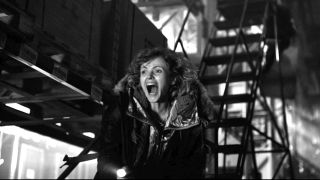
Structurally, it’s effectively a slasher movie/zombie apocalypse chase sequence - something especially demonstrated by the eventually blinded, knife-pawed machine’s mindless and instinctive thumping stabs at the wall. It’s more an inexorable force than malevolent threat, that Bella, as classic victim, can’t ever hope to outrun. All that’s left is delay or distraction to slow the inevitable. And it’s this that creates so much tension. Given Black Mirror’s love of surprise and the unexpected, much of the first half leaves you hanging on finger tips for a reveal that will change the dynamic or add a new element.
It never comes. Technology aside, Metalhead’s affecting because it’s a threat we can all understand at a very basic level: I don’t want to die. Please don’t let the bad thing get me. Despite its slickly designed robot, this is as much a ‘what would you do in that situation?’ parable as any call that came from inside the house. Like all good horror, which is what this basically is, Bella/us are teased just enough hope to make the end even more painful. The raw, almost anguished triumph that comes from defeating the monster taken away so frustratingly by a face full of barbed-tracking pellets. Her fate is sealed; it’s exhausted her (us) just to escape one of these things. With a herd homing in, suicide is less a way out, more a practical solution.

The sparse dialogue only creates more space for the fear, desperation and, ultimately, the story to expand into. Bella barely speaks, a few lines into an unanswered radio to suggest a scrap of humanity surviving somewhere. We’ll never know exactly what happened. Casual mention of ‘the dogs’, the gaffer taped clothes and a disturbing shotgun suicide suggesting that, however this end game played out, it happened gradually enough for people to make their own decisions how to handle it. And, considering the robots Boston Dynamics actually makes, or a very real concern from tech experts that autonomous weapons are one of the biggest immediate future threats, and Metalhead feels as much a warning as a clever exercise in storytelling. Leon Hurley
Episode score: 5/5
Black Mirror season 4 - Black Museum review: “Feels like it’s trying to cram in as much horror as possible to keep viewers amused until the payoff”
It’s fitting that Black Mirror season 4 ends with an anthology episode set in a museum about, well, Black Mirror itself. A microcosm of the entire season, it combines several related stories about the dangers of technology, and wraps them all up under a common theme. It’s perhaps the only way S4 could have ended. It’s also one of the toughest episodes to watch, ratcheting up the tension to near unbearable levels.
Essentially, it’s about Nish, a girl who visits a once-popular tech museum in the desert while charging her electric car. The curator of the grizzly exhibits, Rolo Haynes, takes her on a private tour of some of the items on display, narrating a series of mini-stories as they go. Obviously there’s more to it than a simple collection of digital ghost stories. In terms of structure and pace, it’s a very fragmented hour of TV, which feels like it’s trying to cram in as much horror as possible to keep viewers amused until the payoff at the end.
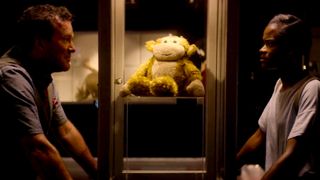
The empathetic doctor story is sick without being too smart, its main problem being that few of us can (ironically) relate to the experience he goes through. It’s a neat piece of body horror to make us squirm, but little else. The ‘cuddly bunny’ plot is pure emotional manipulation, a distilled version of the parental paranoia and helplessness of Arkangel (and to an extent USS Callister). Both are extremely well presented, specifically designed to push viewers to their most uncomfortable states possible, but they feel like half-baked concepts not quite worthy of a full episode and suffer a little because of it. It’s great TV while you’re watching, but none of the stories feel like Black Mirror anywhere near its best. The final narrative, about the Weather Girl killer, is by far the weakest and while it does a decent job of exposing the dark side of humanity’s lust for power… it stumbles from terrifyingly plausible to silly sci-fi in a matter of minutes.
Sure, the ending is satisfying, as the manipulator behind some of Black Mirror’s darkest tales gets his comeuppance, but that doesn’t make Black Museum a classic. On a meta-level, if feels like Brooker is saying goodbye to the season itself (there’s no confirmation he’s leaving Black Mirror, however, and Brooker has already said he’d love to do a fifth), his darkest creations presented exactly as they are: historical pieces with strong warnings to the future of humanity.
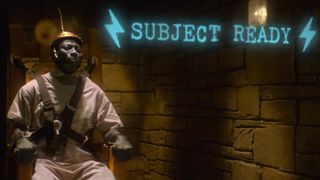
Most fans will see plenty of references to the show’s past and its creators throughout the episode, and Brooker himself is part of the Game of Thrones-style wall of faces that Nish peers during her tour. However, it often feels like Black Museum is nodding and winking so furiously, it forgets to do anything particularly interesting with the core duo of characters. It’s a smart, knowing way to end the most ambitious season of Black Mirror, even if the episode itself is one of the most fragmented and disappointing of the current run. Andy Hartup
Episode score: 3/5
12DOVE was first founded in 1999, and since then has been dedicated to delivering video game-related news, reviews, previews, features, and more. Since late 2014, the website has been the online home of Total Film, SFX, Edge, and PLAY magazines, with comics site Newsarama joining the fold in 2020. Our aim as the global GamesRadar Staff team is to take you closer to the games, movies, TV shows, and comics that you love. We want to upgrade your downtime, and help you make the most of your time, money, and skills. We always aim to entertain, inform, and inspire through our mix of content - which includes news, reviews, features, tips, buying guides, and videos.
Most Popular
